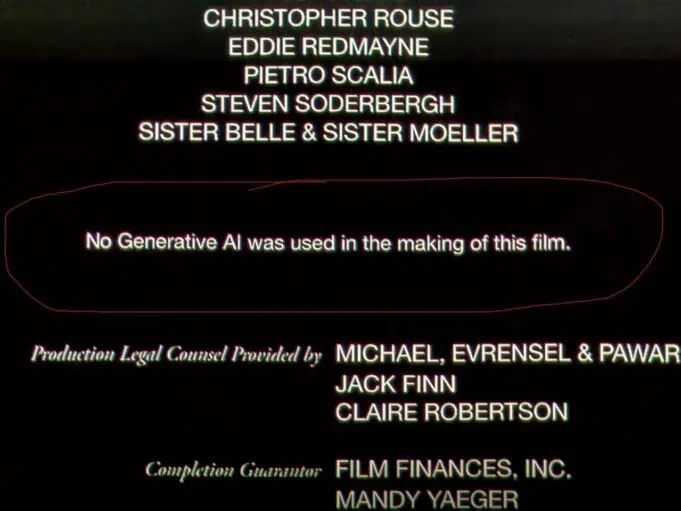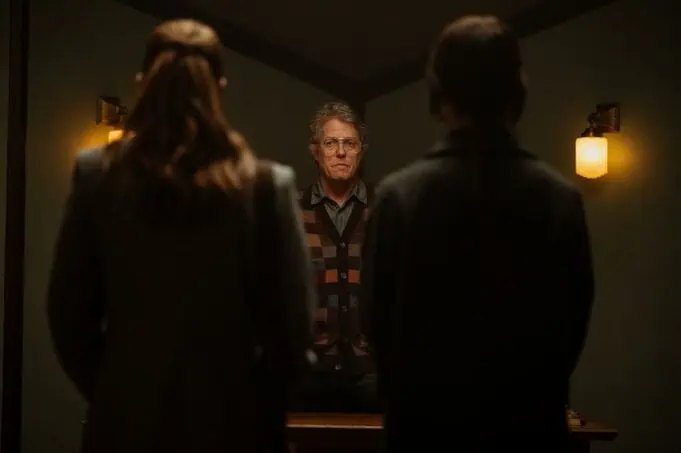AI is the hottest topic here in Silicon Valley, and across the entire world as its disruption and impact can be felt across just about every industry. Many are wondering: is it a good thing, or a not so good thing? And how will it impact our lives going forward?
That conversation has also carried over — no surprise — to the arts.
Gen AI (or Generative AI) can be used to generate things, like images for instance. Video too can be created by artificial intelligence. Unfortunately we’re seeing a lot of nefarious examples of this on social media in particular.
So it was interesting when I noticed this statement in the end crawl of a horror film called Heretic (2024):
“No generative AI was used in the making of this film.”
Here’s a photo of the anti-credit:

That stood out as I hadn’t recalled seeing any recent film make such a declaration.
Unlike Late Night with the Devil (2023) which somewhat controversially did use AI as part of the filmmaking process (to excellent effect!).
So it’s a curious thing — and it makes one man weep and another man sing it would seem.
Gen AI and Filmmaking — A Tool or the Devil’s Work?
I thought about AI and filmmaking (and photography and the arts in general) more that night after the credits rolled. Everyone has their opinion. As a sort of tech guy here in the Valley I tend to embrace all the latest stuff, silly or otherwise. AI, though, is a pretty serious topic and substantial innovation. I use (and love) ChatGPT for many things so perhaps I’m already biased because I’m living life largely in this bubble. In any case, some random thoughts below.
Credits are for Credits
I’m guessing Picasso never stood up after an exhibition and shouted to onlookers: “I did not use Raw Umber in the making of the ‘Three Musicians’!”
Typically we’re for something rather than against. And credits are for just that: crediting people and places associated with the making of the film we just watched.
Tools, of course, are sometimes mentioned. Maybe a camera company (Arri, Panasonic, RED, etc.) or brand of lens. Also things like film finishing processes. All of these are instrumental tools the filmmakers are thankful that exist.
On the other hand, saying something was not used is… well, like I said, a curious thing. Should we appreciate the production that much more because no robots were involved in its making?
AI is Just Another Tool
Manipulating images has pretty much always been part of the artistic process since the beginning. In terms of cinema, even dating back to the early days of the 20th century with films such as the iconic masterpieces The Cabinet of Dr. Caligari (1920, dir. Robert Wiene) and Nosferatu (1922, F.W. Murnau), fooling audiences with creative lighting and special effects and lens trickery were already part of the game.
Modern innovations such as digital video editing, color grading and compositing only furthered the capabilities afforded those trying to create fantastical worlds. Let’s not forget about green (and blue) screen work as well. Obviously, the most significant tool used for the Super Hero era.
Yet, when I’m watching a movie none of this matters. I’m either really sold on the experience or I’m not. It’s not consequential what tools were used and how they were used. Once we’re engrossed should it matter? I wonder. For instance I have no idea how Stanley Kubrick achieved the look of almost every single shot in 2001: A Space Odyssey (1968). All I know is the experience is profound and one of a kind. I’m sure he used lots of leading edge tools of the time — a diopter might be one of them no doubt!
The Human Condition
Then there’s the actual storytelling itself. Here, I believe there’s no substitute for the human condition. At least not yet! While we might turn to various tools to generate images to help bring our vision to life, I think the story itself should remain innately human.
Perhaps there’s a difference: tools vs. story-telling.
Regardless, these are the early days and the AI disruption we’re seeing is only just beginning. I can only imagine where we’ll be in another decade or so. No doubt, there will be continued impacts far and wide, and we can expect it to affect legislation, geo-politics and the arts for years to come.
As for Heretic itself? It’s a bit of a hoot. Horror fans should give it a look. Quite entertaining to see Hugh Grant in a bit of a devilish and tongue-in-cheek role. Recommended — even more so thanks to the lack of gen AI?


